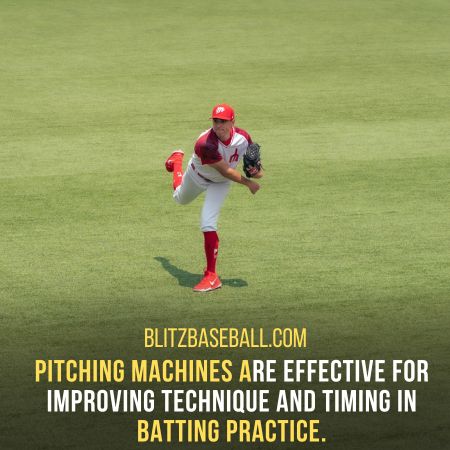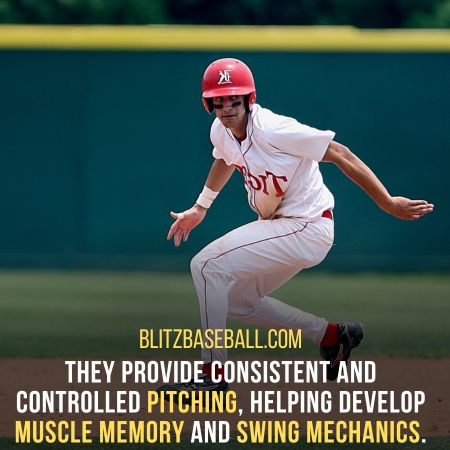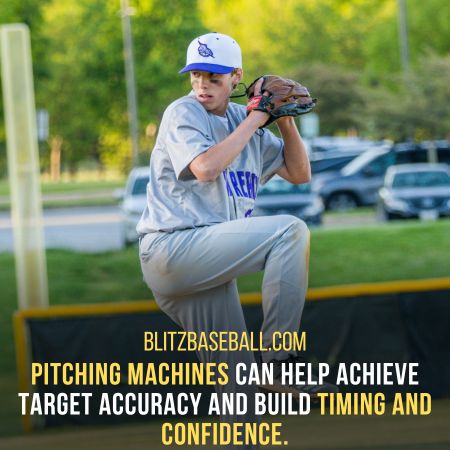Pitching machines are a popular tool for batting practice, offering consistent and accurate pitches to help players improve their skills. However, there are limitations to consider.
Are Pitching Machines good for batting practice? While pitching machines can enhance technique and timing, they cannot fully replicate the complexity and unpredictability of live pitchers. This may hinder a player’s ability to adjust to different pitches.
In Major League Baseball, pitching machines are often used alongside live pitching for specific purposes. Each player has their own preference, and factors such as cost and durability must be considered when choosing a machine.
Key Takeaways
- Pitching machines are effective for improving technique and timing in batting practice.
- They provide consistent and controlled pitching, helping develop muscle memory and swing mechanics.
- Pitching machines can help achieve target accuracy and build timing and confidence.
- However, they cannot fully replicate the complexity and unpredictability of live pitchers, hinder the ability to adjust to different pitches, and lack the wide range of pitches, speeds, and movements.
Are Pitching Machines Good For Batting Practice?
Pitching machines have been found to be effective tools for improving technique and timing in batting practice. They provide consistent and controlled pitching, allowing players to work on their swing mechanics and develop muscle memory.
By replicating specific pitches, pitching machines also help players in achieving target accuracy. The timing development and confidence building that comes from facing a consistent pitching speed can be beneficial for players.
However, the machines lack the ability to simulate the wide range of pitches, speeds, and movements that live pitchers can deliver. This can lead to a potential over-reliance on consistent pitches from machines and a lack of challenge compared to facing live pitchers.
Therefore, while pitching machines have their advantages, it is important to use them in conjunction with live pitching to fully prepare for game-like situations.

Limitations and Challenges
Facing a pitching machine may provide consistent pitches, but it lacks the complexity and unpredictability of live pitchers. While pitching machines have their advantages, there are limitations and challenges that come with relying solely on them for batting practice.
Here are three key limitations to consider:
-
Inability to replicate the variety of pitches: Pitching machines typically offer a limited range of pitches, making it difficult for batters to practice against different types of pitches, such as curveballs or changeups.
-
Lack of timing adjustment: Live pitchers can adjust their timing and delivery speed, creating a more realistic game-like experience. Pitching machines, on the other hand, are often limited in their ability to replicate these adjustments, leading to potential timing issues for batters.
-
Limited adaptation to game situations: Pitching machines cannot replicate the strategic decisions made by live pitchers during a game. This lack of adaptability can hinder a batter’s ability to read and react to different game situations.
While pitching machines can be beneficial for certain aspects of batting practice, it is important to supplement their use with live pitching to develop a more comprehensive skill set.

Use by MLB Players
MLB players have found various ways to incorporate pitching machines into their training routines. While some players may rely heavily on live pitchers for game-like situations, pitching machines provide a valuable supplement for specific practice purposes.
For example, players can use pitching machines to work on their timing and swing mechanics in a controlled environment. The consistency of pitches from a machine allows players to focus on their technique and make adjustments as needed.
Additionally, pitching machines can be programmed to replicate specific pitches, helping players develop their ability to recognize and react to different types of pitches.
However, it is important for players to use a combination of live pitching and machines to ensure they are adequately prepared for the challenges they will face in real-game situations.
| Advantages | Disadvantages |
|---|---|
| Consistent pitching | Inability to replicate live pitchers |
| Controlled environment | Lack of challenge compared to live pitchers |
| Targeted practice | Potential over-reliance on machines |
| Technique improvement | |
| Timing development |
Choosing the Right Machine
When selecting the right pitching machine, players should consider factors such as cost, adjustability, and durability to ensure they get the most out of their practice sessions.
Cost is an important factor to consider, as pitching machines can range in price from a few hundred dollars to several thousand dollars. It’s essential to find a machine that fits within the player’s budget without compromising on quality.
Adjustability refers to the machine’s ability to throw different types of pitches at various speeds, allowing players to practice against a wide range of pitches.
Durability is crucial as well, as players want a machine that can withstand regular use without breaking down.

Frequently Asked Questions
Are there any safety concerns or risks associated with using pitching machines for batting practice?
There are safety concerns associated with using pitching machines for batting practice. The speed and accuracy of the pitches can pose a risk of injury if not used properly. Protective gear and supervision are recommended to minimize these risks.
Can pitching machines be adjusted to replicate different pitch speeds and types?
Pitching machines can be adjusted to replicate different pitch speeds and types. They offer the ability to practice against various pitches, allowing batters to improve their skills and adapt to different game situations.
How do pitching machines compare to traditional batting practice methods, such as hitting off a live pitcher?
Pitching machines offer consistent and controlled pitches, aiding in technique improvement, timing development, and confidence building. However, they can’t replicate the complexity and unpredictability of live pitchers and may lead to over-reliance on consistent pitches.
Are there any specific drills or exercises that can be done with pitching machines to enhance batting skills?
There are several specific drills and exercises that can be done with pitching machines to enhance batting skills. These include working on timing, pitch recognition, and reaction, as well as focusing on specific pitch types and locations.
Are there any specific maintenance or care requirements for pitching machines to ensure optimal performance and longevity?
Pitching machines require regular maintenance and care to ensure optimal performance and longevity. This includes cleaning the machine, checking and adjusting the pitching mechanism, lubricating moving parts, and storing it in a dry and secure place when not in use.
